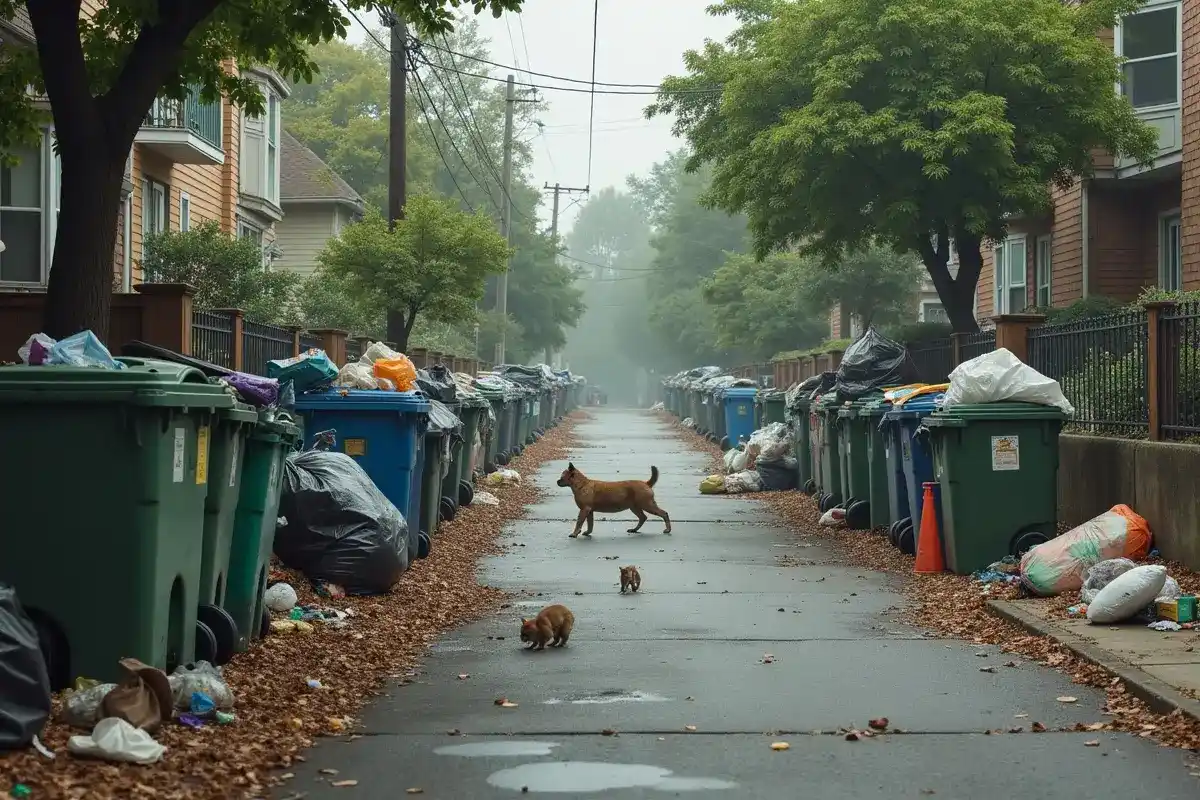Standing at your window on collection day, watching the waste truck drive past your overflowing bins, creates that sinking feeling every homeowner knows too well. Missed collections happen more often than most people realize, and the reasons behind them aren’t always obvious. Understanding why bins get skipped and knowing how to handle these situations can save significant stress and prevent waste from piling up around your property.
Common Reasons Why Collections Get Missed
Weather plays a bigger role in collection schedules than most homeowners expect. Heavy snow, ice, or flooding can make certain roads inaccessible, forcing collection crews to skip entire streets until conditions improve. During extreme weather events, councils often prioritize main roads and emergency routes, leaving residential areas for later in the week or even the following collection cycle.
Contamination issues cause more missed collections than any other single factor. When the wrong items end up in recycling bins or hazardous materials appear in general waste, collection crews have the authority to refuse pickup entirely. This isn’t just about following rules – contaminated loads can damage processing equipment or pose safety risks to workers handling the waste.
Vehicle breakdowns and staffing shortages create unpredictable gaps in service. Collection trucks operate under demanding conditions, and mechanical failures happen at inconvenient times. Similarly, when crew members call in sick or drivers become unavailable, routes get reorganized or delayed, sometimes pushing collections to different days without advance notice to residents.
Bank holidays and seasonal schedule changes catch many homeowners off guard. Collection dates often shift during holiday weeks, but the communication about these changes doesn’t always reach every household clearly. The problem gets worse when holiday schedules conflict with already-full trucks from previous days’ collections.
Immediate Steps After a Missed Collection
The first priority after discovering a missed collection involves securing your waste properly. Leaving bins on the street indefinitely invites problems with animals, wind-scattered rubbish, and potential council enforcement action. Bring bins back onto your property and ensure lids remain tightly closed to prevent pest issues and odors from developing.
Contact your local council or waste collection provider as soon as possible after noticing the missed pickup. Most councils have dedicated phone lines or online reporting systems for collection issues. Reporting the problem quickly increases the chances of getting a same-day or next-day makeup collection, especially if the issue affected multiple households in your area.
Document the situation with photos showing your properly presented bins and any identification numbers visible on the containers. This evidence becomes valuable if disputes arise about whether bins were presented correctly or if compensation claims become necessary for any resulting problems.
Check with neighbors to determine if the problem affected multiple households or just your property. Widespread missed collections usually indicate systematic issues that councils address more urgently than individual household problems. This information also helps when reporting the issue to your collection provider.
Alternative Disposal Solutions
When regular collections fail, private waste services often provide the most reliable backup option. Companies specializing in waste collection cambridge and surrounding areas typically offer more flexible scheduling than council services, making them particularly valuable during peak periods or when regular services face disruptions.
Local recycling centers provide another option for immediate waste disposal, though this requires transportation and sorting waste according to facility requirements. Most centers accept general household waste, garden refuse, and recyclables, but opening hours and vehicle size restrictions can limit accessibility for some households.
Community initiatives sometimes emerge during widespread collection disruptions. Neighborhood groups occasionally organize shared transportation to recycling centers or coordinate with private collection services for bulk pickup deals. These arrangements work particularly well in areas with strong community networks and active resident associations.
Some retailers and manufacturers operate take-back programs for specific items, particularly electronics, batteries, and certain packaging materials. While these programs don’t solve general waste disposal needs, they can help reduce the volume of accumulated refuse while waiting for regular collections to resume.
Prevention Strategies That Actually Work
Proper bin presentation prevents many collection issues before they start. Place bins at the designated collection point before the specified time on collection day, ensuring containers aren’t blocked by parked cars, construction equipment, or overhanging vegetation. Collection crews operate on tight schedules and often skip bins that require extra effort to access.
Understanding contamination rules for your area reduces the risk of refused collections significantly. Different councils have varying requirements for recycling separation, food waste preparation, and prohibited items. Keeping a reference sheet near your bins helps family members and visitors follow the correct procedures consistently.
Building relationships with regular collection crews creates goodwill that pays off during problematic situations. Simple gestures like moving vehicles when requested or ensuring clear access paths demonstrate cooperation that crews remember. While collection staff follow strict protocols, they also exercise discretion in borderline situations.
Developing backup plans before problems occur eliminates the stress of scrambling for solutions during missed collections. Identify nearby recycling centers, research private collection options, and establish relationships with neighbors who might share transportation to disposal facilities when needed.
Working With Your Council Effectively
Most councils have established procedures for handling collection complaints and service failures. Understanding these processes and following them correctly increases the likelihood of quick resolution and prevents issues from escalating unnecessarily. Keep records of all communications, including reference numbers and the names of staff members handling your case.
Persistent problems often indicate systematic issues that require escalation beyond frontline customer service staff. If missed collections become frequent or if promised makeup collections don’t materialize, requesting supervisor involvement or filing formal complaints through official channels usually produces better results than repeated calls to general helplines.
Long-Term Solutions and Service Improvements
Consider whether your current waste collection arrangement meets your household’s actual needs. Families generating more waste than their allocated bin capacity should explore additional services or larger containers rather than hoping for lenient enforcement of overfilling restrictions.
Regular maintenance of bins and collection areas prevents many ongoing problems. Clean containers with tight-fitting lids attract fewer pests and create better working conditions for collection crews. Well-maintained collection points also reflect positively on your property and neighborhood.
Staying informed about service changes through council communications helps avoid surprises that lead to missed collections. Sign up for email alerts, follow social media accounts, and maintain current contact information with your waste collection provider to receive timely updates about schedule modifications or service disruptions.
The key to managing waste collection problems effectively lies in preparation, quick response, and maintaining multiple disposal options. While missed collections create immediate inconvenience, understanding the available solutions and prevention strategies turns these situations into manageable temporary setbacks rather than major household crises.





Leave a Reply
You must be logged in to post a comment.